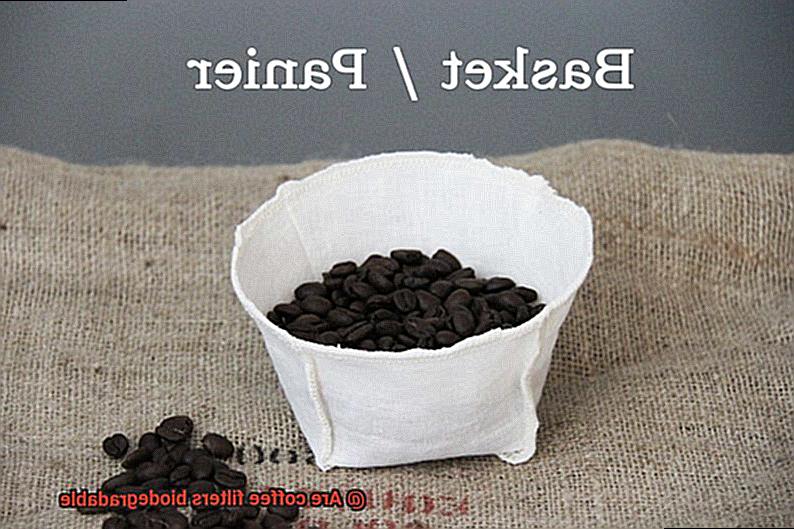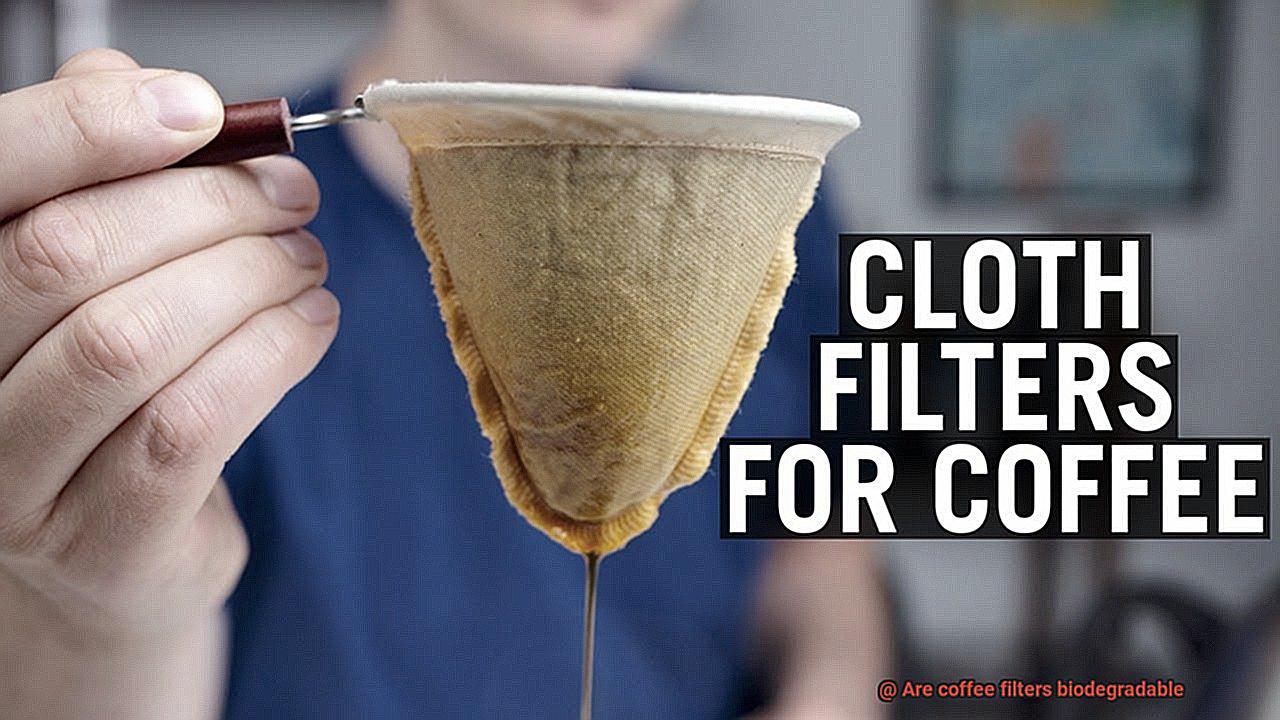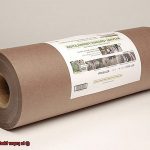Do you start your day with a freshly brewed cup of coffee? If so, you’re not alone. Millions of people around the world rely on coffee to get their day started. But have you ever stopped to consider what happens to your coffee filters once they’re used up? Are coffee filters biodegradable?
It’s a question that’s becoming increasingly important in today’s environmentally conscious society. While coffee filters are primarily made from paper, not all filters are created equal when it comes to their impact on the planet.

In this blog post, we’ll dive into the issue of coffee filter biodegradability and explore what you can do to make sure your daily caffeine fix isn’t harming the environment. We’ll examine different types of coffee filters and their pros and cons, as well as ways you can reduce your environmental footprint.
So whether you’re a seasoned coffee drinker or just starting out, join us as we take a closer look at this fascinating and important topic. Let’s brew up some knowledge.
What are Coffee Filters Made Of?
Contents
The answer may surprise you. Most coffee filters are made from either paper or a combination of paper and other materials.
Paper filters are the more eco-friendly option, as they are biodegradable and can break down in compost or landfills within a few weeks to a few months. Unbleached paper filters are even better for the environment, as they haven’t undergone any chemical bleaching process. They’re brown in color and have a more natural appearance, making them a stylish choice for your morning brew.
On the other hand, bleached paper filters have undergone a chemical process to achieve their bright white color. While they’re still biodegradable, they may take longer to decompose due to the chemicals used in their production. So, if you’re looking for an eco-friendlier option, unbleached filters are the way to go.
Did you know that some coffee filters may also be made from a combination of paper and other materials such as cellulose or polyester? While these types of filters may not be as eco-friendly or biodegradable as those made from solely paper, some manufacturers are working hard to create more sustainable options that reduce environmental impact.
However, it’s important to note that the biodegradability of coffee filters depends on the materials used in their production. It’s always best to check the packaging or manufacturer’s website for information on a specific filter’s biodegradability.
Plastic filters are not biodegradable and can take hundreds of years to decompose. This means that they will sit in landfills for centuries, contributing to environmental pollution. It’s essential to choose coffee filters made from sustainable materials like bamboo or hemp, which are free from harmful chemicals and adhesives that can affect their ability to break down naturally.
Are Paper Coffee Filters Biodegradable?
If you’re a fan of paper coffee filters, you may be wondering whether they’re biodegradable. Well, we have great news for you – paper coffee filters are indeed biodegradable and can break down naturally over time without causing any harm to the environment.
To make paper coffee filters, wood pulp is used to create a paper product that is then shaped into a filter. While this process requires resources like water and energy, the end result is still biodegradable. So, when disposed of properly, paper coffee filters will eventually break down and decompose in a landfill or composting facility.
But it’s important to note that not all landfills or composting facilities are created equal. Some may not provide the necessary conditions for biodegradation to occur. Furthermore, the presence of other materials like plastics can impede the process. This is why it’s crucial to dispose of your paper coffee filters correctly and consider eco-friendly options.
One way to reduce your ecological footprint is to opt for unbleached or recycled paper filters. These options can minimize the environmental impact of production and disposal while still providing an excellent coffee experience. Additionally, reusable cloth filters are also available for those who want to eliminate waste altogether.
Are Plastic Coffee Filters Biodegradable?
Unfortunately, the answer is no.
Plastic is a synthetic material that doesn’t break down naturally over time. It can take hundreds of years for plastic to decompose, leaving behind harmful microplastics that pollute our environment and harm wildlife. It’s like having a pesky stain on your favorite shirt that just won’t go away.
However, there’s good news for environmentally conscious coffee drinkers. Many coffee filter manufacturers now produce biodegradable options made from materials like bamboo, hemp, or unbleached paper. These alternatives break down naturally in the environment and don’t contribute to pollution. It’s like planting a seed that grows into a beautiful tree.
It’s essential to note that even though some plastic coffee filters may be labeled as “recyclable,” this doesn’t necessarily mean they’re environmentally friendly. Recycling plastic still requires energy and resources, making it an unsustainable solution. It’s like putting a Band-Aid on a broken arm.
Adhesives and Compostable Coffee Filters
You opt for reusable cups and utensils, and you’ve likely considered eco-friendly coffee filters. But did you know that the type of adhesive used to make your coffee filter can have a significant impact on its biodegradability?
Adhesives are commonly used in the production of coffee filters, but not all adhesives are created equal. Most adhesives used in coffee filters are not biodegradable, which means they cannot be composted. This is where compostable adhesives come in.
Compostable coffee filters are made from natural materials that can be broken down by microorganisms in a composting environment. These filters are free from synthetic adhesives, making them fully compostable. But not all compostable filters are equal. Some may take years to decompose fully, while others break down quickly.
To ensure that your coffee filters are truly biodegradable, look for those made from unbleached paper or other natural materials with certified compostable adhesives. By doing so, you can enjoy your morning cup of joe knowing that you’re making a more sustainable choice.
Just like planting a seed that grows into a tree, your compostable coffee filter needs the right materials to break down naturally in the environment. By choosing a filter with a compostable adhesive, you’re planting the seed for a healthier planet.
The Environmental Impact of Coffee Filters
While paper coffee filters are a popular choice, not all filters are created equal. Some may contain harmful chemicals or synthetic materials that can wreak havoc on the environment.
Think about what happens when non-biodegradable coffee filters end up in landfills: they take years to break down completely. This leads to a buildup of waste that harms our ecosystems and wildlife. And if that’s not bad enough, many coffee filters are bleached, which can release harmful chemicals into the environment.
Thankfully, there’s a solution. Biodegradable coffee filters made from materials like bamboo, hemp, or cotton break down quickly and don’t contain harmful chemicals or synthetic materials. By choosing these types of filters, you can significantly reduce the environmental impact of your morning cup of coffee.
It’s like planting a seed for a healthier planet with every brew. By making the simple switch to biodegradable coffee filters, you’re reducing waste and promoting sustainability. So go ahead and enjoy your morning cup of coffee without guilt, knowing that you’re doing your part to take care of our planet.
Remember, the choice is yours. It’s easy to make a difference by choosing biodegradable coffee filters and making small changes in our daily routines.
Choosing Eco-Friendly Options
Something as simple as selecting the right coffee filter can be a step towards a healthier planet.
When it comes to coffee filters, it’s crucial to choose biodegradable options. Traditional paper filters made from wood pulp are typically biodegradable and can break down naturally over time. But beware of newer filters made from plastics like nylon or polypropylene that may not be biodegradable and can take years to decompose, releasing harmful chemicals in the process.
To ensure your coffee filters are eco-friendly, check the packaging for biodegradable options. And when disposing of them, composting is key. It’s vital to compost them rather than throw them in the regular trash. Composting allows for the filters to break down more efficiently and return nutrients back into the soil.
It’s important to understand why choosing eco-friendly options matters. Every small choice we make adds up and can have a significant impact on the environment. By opting for biodegradable coffee filters and other everyday products, we can reduce our waste and promote sustainability.
Choosing eco-friendly options is like planting a seed for a healthier planet with every brew. So let’s make conscious choices and do our part in protecting our environment.
Conclusion
In conclusion, the importance of coffee filters’ biodegradability cannot be overstated in today’s environmentally conscious society. While paper filters are a more eco-friendly option, not all filters are created equal when it comes to their impact on the planet. Plastic filters, for example, can take hundreds of years to decompose and pollute our environment with harmful microplastics.
To minimize our environmental impact, it’s crucial to choose coffee filters made from sustainable materials like bamboo or hemp that are free from harmful chemicals and adhesives. Opting for unbleached or recycled paper filters is also an excellent way to reduce waste while still enjoying a great cup of coffee. For those who want to eliminate waste altogether, reusable cloth filters are available.
By making small changes like choosing biodegradable coffee filters and composting them properly, we can significantly reduce our waste and promote sustainability. Remember that every small choice adds up and can have a significant impact on the environment.





